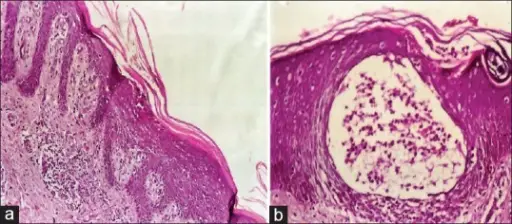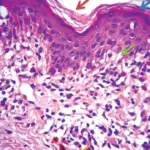Psoriasis is a complex, chronic, inflammatory, multifactorial disease involving keratinocytes’ hyperproliferation of the epidermis, with an upsurge in the epidermal cell turnover rate.
What is the Pathology of Psoriasis?
The pathology of psoriasis is:
-Etiology: The cause of psoriasis is a genetic predisposition, immunologic factors.
-Genes involved: HLA-Cw*0602 allele, LCE3C, and LCE3B, genes.
-Pathogenesis: The sequence of events that lead to psoriasis: CD4+ T cells pledge the illness in cooperating with the skin antigen-presenting cells, signaling activation of CD8+ T cells at the epidermis. Interactions amid CD4+ T cells, CD8+ T cells, dendritic cells, and keratinocytes result in a cytokine “soup” dominated by TH1 type cytokines IL-12, IFN-γ, and TNF. Infiltrated lymphocytes too produce growth factors for keratinocytes.
-Morphology: The morphology associated with psoriasis shows a noticeable epidermal thickening, with downward elongation of the rete ridges.
-Histology: The histology associated with psoriasis shows parakeratosis, regular acanthosis to the epidermis.
How does Psoriasis Present?
Patients with psoriasis are typically more common in females than males present at an age range of 20 to 30 years. The symptoms, features, and clinical findings associated with psoriasis include pain, afebrile, pruritus rash, silvery raised inflamed lesions, salmon-pink papules. Blepharitis ocular manifestation.
How is Psoriasis Diagnosed?
Psoriasis is diagnosed through the clinical presentation, laboratory studies, rheumatoid factor test usually negative, ESR, uric acid levels.
How is Psoriasis Treated?
Psoriasis is treated through medical care- topical and systemic medication, climatotherapy, stress reduction, phototherapy, and moisturizers, ocular lubricants, and surgical treatment.
What is the Prognosis of Psoriasis?
The prognosis of psoriasis is fair. It is a benign, lifelong ailment with remissions and aggravations and at times refractory to management.



